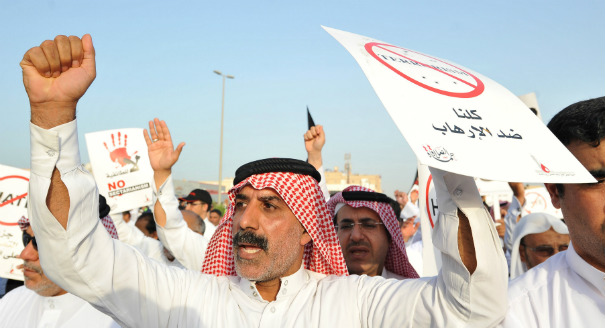Ali al-Nimr, a young Shia anti-government protester who was sentenced to death last year, has lost his appeals before the Saudi Arabian Specialized Criminal Court and Supreme Court and is due to be executed once King Salman ratifies the sentence, which he could do at any time. This case not only highlights the barriers to due process within the Sunni-based legal system, but also the ramifications of the increasing sectarian divide on Saudi Arabia’s 15 percent Shia population.
The case goes back to 2012, when then-17-year-old Ali al-Nimr was arrested with a few other young Shia boys and accused of engaging in protests, riots, and chanting slogans against the state. Shortly after, his uncle Nimr al-Nimr, a prominent religious Shia preacher, was arrested for his increasingly fiery sermons, which authorities claimed “disobeyed the ruler,” a terrorism related charge. After his uncle’s arrest, the prosecutors then added attacking police cars and hiding wanted individuals to Ali al-Nimr’s charges. Ali’s charges were based on interrogations and confessions—which the Nimr family claims were obtained under torture—that were carried out in the absence of his lawyer. Ali, his uncle, and four other young Shia protesters were found guilty of charges and sentenced to death and currently await their executions.
In the prosecution’s statement, Ali was accused of heraba, a serious act mentioned in Qur’an to describe assaults, ambush, or murder by armed outlaws. The Qur’anic punishments mentioned could include death, crucifixion, amputation of extremities, or exile. Though Islamic scholars across centuries have argued on the exact conditions required to apply the horrific sentence of heraba and which acts are worthy of such sentence, Saudi supreme scholars did not. The prosecution against Ali referred to Ali’s charges of disobeying the ruler as a greater threat than the actions usually described as heraba and subsequently to article 12 of the Basic Law of Governance, “Consolidation of the national unity is a duty. The State shall forbid all activities that may lead to division, disorder, and partition.” But due to Ali’s claims of forced confession, three judges have transmuted the death sentence from heraba, which mandates a fixed set of punishments, to ta’zir, which leaves the manner of execution to judges’ discretion, arguing that death is a terminal sentence anyway.
In Ali’s case, lack of adequate legal representation, the method of arrest that left him seriously injured, and the court’s inability to present valid evidence beyond a forced confession represent ample grounds for dismissing the case. Furthermore, the use of religious justifications against dissidents has rarely resulted in the punishment of death.
The question remains whether Ali’s Shiism was the reason his death sentence was deemed appropriate by the Sunni legal system. Sunni dissidents have not faced the same charges, though some jihadis have. Although Ali was not part of an armed militia targeting non-members, comparing his case to the legal and political treatment of jihadis is helpful to understand the issue. In 2004, then Deputy Minister of the Interior (now Minister of Interior and Crown Prince) Mohammed bin Nayef established the munasaha (“advising”) program, endorsed as the “soft approach” to fight terrorism. The program aims to redefine jihad and integrate extremists back into their community by handing out financial aid and helping them find jobs.
Last year, an investigation into attacks on Shia religious gatherings in Dalwa in Eastern Province found that 44 out of 77 suspects in the attacks were prior beneficiaries of the program. Another attack on an Isamili mosque in Najran on October 26 was claimed by a Saudi member of the Islamic State, who was released just months ago from the program. This is not surprising; the program’s preachers redefine jihad as only legitimate if mandated by the king, but most jihadis do not easily accept such a simplification of the concept. The main religious Sunni discourse in Saudi Arabia is filled with hate speech and conspiracy theories against the Shia. This is compounded by the political use of the Sunni–Shia divides to promote the armed conflicts in Bahrain, Syria, and Yemen. A statement issued by Saudi religious scholars on October 3 in response to Russian involvement in the Syrian conflict reflects this support for jihad against Shia. The scholars called upon true believers to fight against “Safavid” government of Syria and its allies, portraying the conflict in Syria as a reenactment of the crusades, with Shia heretics joining forces with the Russian crusaders.
The Saudi authorities are treading a dangerous line. While it is well within the Saudi state’s ability to execute a few Shia protesters and keep any Sunni opponents locked up for life, this policy may be hard to sustain. In the aftermath of the May 22 suicide attack on a Shia mosque in Qudeih, a Shia man cautiously confronted the Minister of Interior, saying that the state was an accomplice to the attack for failing to provide Shia effective security measures. The Minister firmly responded that “the state is the sole entity allowed to keep order,” though it is unclear how. Later on, members of a Shia neighborhood watch that sprung up in the wake of the attack were imprisoned and lashed for seeking to keep local order.
Terrorists’ suicide attacks against minorities and Saudi Arabia’s ill-thought foreign policy will no longer be the only threats to security in the kingdom. As the number of Saudis of different sects and backgrounds watch their relatives herded to prisons or killed in a fever of religious violence, more home-grown violence will be expected. This will be hard to contain with the current policies—lower oil prices mean buying journalists or preachers to spread the kingdom’s preferred narrative will not be sustainable, nor will they be effective to confront large-scale violations.
Hala Al-Dosari is a Saudi writer and a visiting scholar in women’s health at the Johns Hopkins University School of Nursing.






